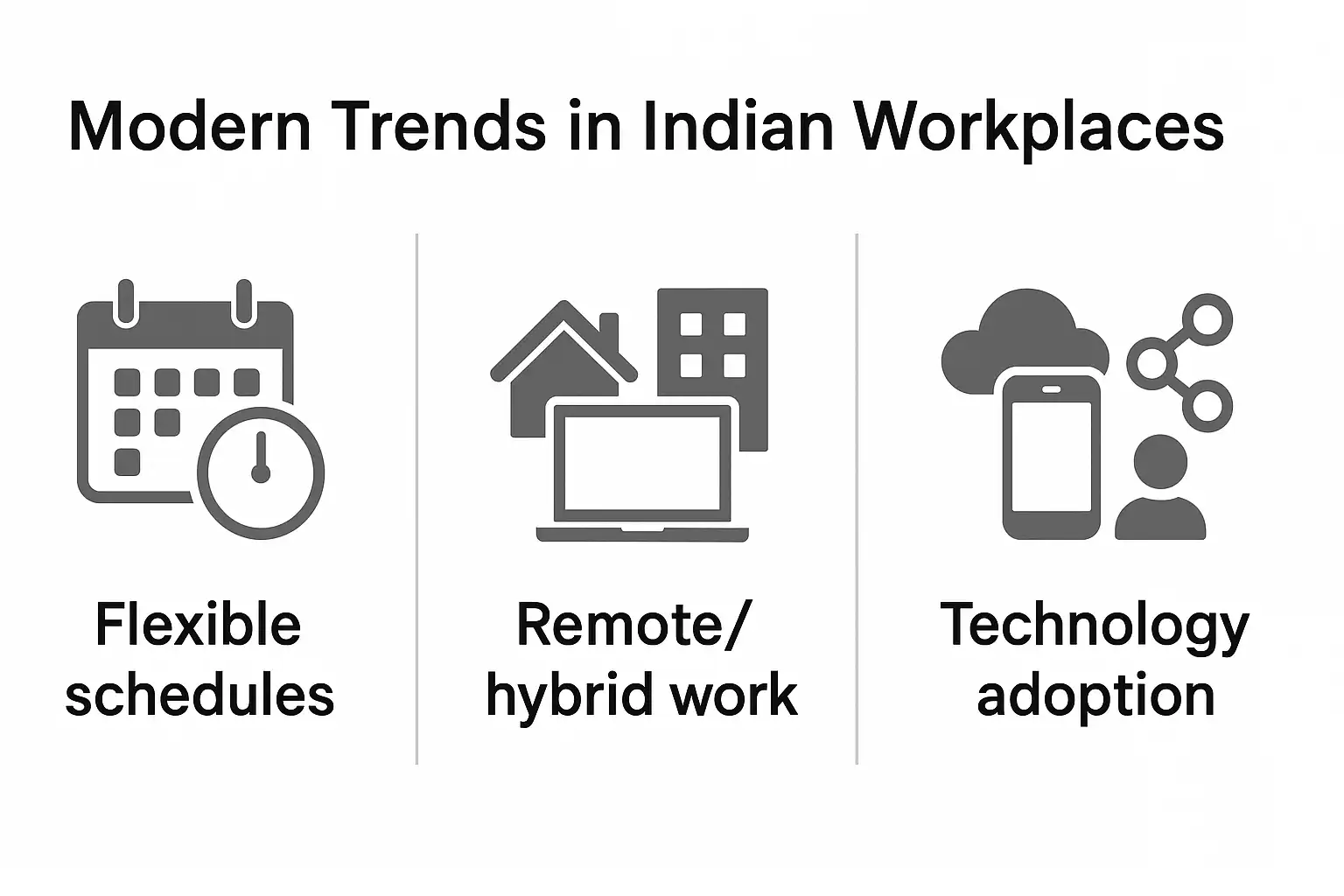Work Culture in India: What Global Employers Need to Know

India’s work culture is a blend of deep-rooted traditions and modern ambitions. For global employers expanding into India, understanding this dynamic environment can determine how successfully teams perform and grow.
In India, workplace culture has an interesting mixture of the traditional and modern. These are principles that have surprisingly deep roots, elements of hierarchy, respect, collaboration, and creativity.
For global employers, understanding the work culture in India is key to managing teams effectively and fostering strong cross-cultural relationships.
It extends to more than simply carrying out better operations; it creates connections that enable teams to flourish.
Understanding the Foundation of Indian Work Culture

The work culture of India is characterized by decades of society, education, and community values. To respect older people, to be committed to our line of work, and to care about others who are around us are the things that will forever be ours. In the majority of Indian businesses, the pecking order still holds. It is not rare for choices to trickle down and for employees to show deference to those in charge.
But this is changing somewhat. Younger professionals now value participation, open communication, and the chance to share ideas freely. This blend of traditional and modern attitudes presents a unique environment where employees want stability accompanied by appreciation for development and gratitude.
Relationship-Driven Workplaces
In India, business is often built on trust and relationships. Before deals or decisions, people prefer to establish a comfort level. Team bonding and informal discussions matter just as much as meetings and reports.
Here, workplaces are like extended families. Workers in the workplace socialize together, have meals together, and support each other in personal matters. It makes cooperation between each other denser and increases the level of enthusiasm of the comrades.
For international employers, recognizing these social refinements goes a long way. It pays to take time to know and to honor individual relationships. It facilitates trans-cultural communication and makes it sincere.
The Changing Face of Working Life in India

The working life in India has transformed significantly in the past decade. Owing to fast-track digitalization and international exposure, there has been a tendency among employees to adopt flexible and dynamic methods of work.
Flexible schedules, remote work, and flexible schedules are gaining acceptance, particularly in cities. Generation Y professionals are looking for a work-life blend and appreciate meaningful workplaces, not conventional freebies.
However, there persists a good level of work devotion. Employees extend their job to the completion of deadlines or supporting fellow team members. This devotion comes from a need to demonstrate ability and gain respect, and not simply to be rule-bound.
Key Traits of Work Culture India Brings
1. Respect for Hierarchy and Seniority
India’s workplaces often lean on hierarchy. Titles and years in the role influence how people interact. Young workers can sit and wait for direction instead of just doing things. However, there are increasing numbers of postmodern workplaces that are flattening and encouraging workers to talk more.
2. Indirect Communication Is Common
Direct criticism is often avoided. Instead, feedback is shared gently, sometimes via intermediaries or with cushioning words. For a manager from abroad, this can feel vague. But with patience and asking clarifying questions, understanding improves.
3. Collectivism and Team Emphasis
Workplace culture in India emphasizes the group over the individual. Successes are frequently shared among teams. Peer recognition boosts enthusiasm more than individual praise.
4. Diversity Across Regions
India is huge. A Mumbai workplace may be unlike a Kolkata or Bengaluru workplace. Regional local language, local ways, local cuisine, and regional calendars of festivals are different. A multinational company recognizing and appreciating regional distinctions demonstrates respect.
5. Celebrations, Rituals, and Festivity
Working life in India tends to suspend to celebrate festivals—Diwali, Holi, Eid, and Christmas, as well as provincial ones. These celebrations reinforce ties. Analogously, little rituals such as tea-time conversations in the morning or birthdays sustain goodwill.
6. Blend of Tradition and Innovation
While older businesses may emphasize rules and protocol, younger and tech firms lean more toward innovation, flexible hours, collaboration, and openness. Indian teams often adapt well to hybrid ways of working.
7. Long Work Hours, but Changing Trends
Traditionally, many Indian employees worked long hours as a sign of dedication. In some sectors, this is still true. Yet, more companies now stress work-life balance, mental health, and flexible schedules to retain talent.
The Role of Technology in Shaping Modern Culture

India’s younger workforce is highly tech-savvy. From cloud collaboration to digital payments, technology has transformed how people work and communicate.
This has also given rise to new kinds of organizations that blend global work ethics with local values. Many of these companies are redefining what it means to have the best work culture company in India — one that respects employees’ individuality, fosters innovation, and rewards initiative.
Common Misunderstandings and How to Avoid Them
Many global managers assume that Indian employees are reluctant to speak up or resist flexibility — but this is rarely the full story. Communication styles, hierarchy, and relationship dynamics simply work differently. By understanding these nuances, employers can build smoother collaboration and stronger trust.
Working With Indian Culture: Tips for Global Employers
If you’re managing or planning to expand teams in India, here are a few things to keep in mind:
Build trust before expecting results. Relationships form the foundation of good teamwork.
Be respectful, but approachable. A warm leadership style works better than an authoritative one.
Encourage feedback. Many employees hesitate to voice opinions unless invited to.
Recognize effort publicly. Recognizing accomplishments, no matter how little, greatly encourages employees.
Adapt to time flexibility. Realize that temporary delays or extended conversations are the natural collaborative process.
Small cultural refinements help make international teams more united and effective.
Why Understanding Work Culture in India Leads to Better Outcomes
When global employers value working with Indian culture, teams feel understood and respected. This decreases friction, boosts morale, and boosts retention. Employees who are heard are likely to provide more discretionary effort.
India provides a pool of talent brimming with creativity, resilience, and adaptability. But to exploit it, leaders cannot only lead from a distance but also comprehend, adapt, and collaborate with local norms. That kind of thoughtfulness makes global teams stronger.
Whether you’re expanding your global team or starting operations in India, aligning with local work culture ensures smoother collaboration and higher employee engagement. With platforms like Synkpay, companies can efficiently manage recruitment, payroll, and compliance while adapting to India’s evolving professional landscape.
Final Thoughts
India’s work ethos rests upon respect, relationships, and responsibility — but it still changes as each new generation of employees walks in the door. For managers, it’s a constant learning, adapting, and maturing along with employees.
Synkpay assists companies in managing and recruiting Indian teams in complicated ways. With local insight and international strategy, we enable companies to converge with the workplace culture of the country and establish enduring prosperity.
FAQs
Q. What is the work culture of India compared to the US?
In India, hierarchy, respect, and relationships carry weight. Decisions often flow top-down. In the US, flatter structures and direct communication are more common. Global employers should adapt by blending firmness with warmth.
Q. What are typical working conditions in India?
Standard workweeks often run 40 to 48 hours. In some industries, overtime happens. However, more firms now allow remote work, flexible timings, or no-meeting days to reduce burnout.
Q. Is India a hardworking country?
Yes, many Indian professionals take pride in working hard and putting in effort. But modern workplaces are pushing for smarter work, not just longer hours.
Q. How does diversity show up in the Indian workplace culture?
India’s diversity means different languages, religions, food, and festivals. A single office might have staff from many states. Inclusive workplaces respect local customs and give holidays accordingly.
Q. How to negotiate with Indian professionals?
Negotiations often expect a bit of discussion. Be fair, transparent, and open to small tweaks. Respecting dignity is more important than pushing maximal demands.
